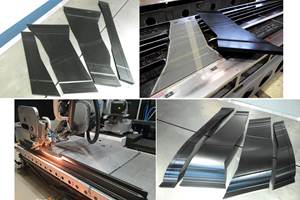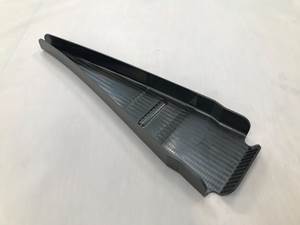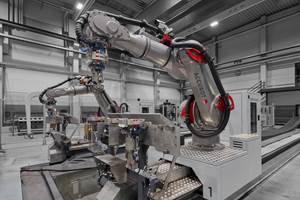Great Bay Community College to host training session for nondestructive testing professionals
Great Bay Community College will be hosting nondestructive testing (NDT) expert Toni Bailey, for a training session on March 26, 2019, for NDT professionals working in the aerospace industry.
Great Bay Community College (GBCC, Rochester, N.H., U.S.) will be hosting nondestructive testing (NDT) expert Toni Bailey, who will be leading a half-day training session on March 26, 2019, for NDT professionals working in the aerospace industry.
NDT is the examination, test or evaluation of a part without destroying or altering the part in any way, for the purpose of determining whether conditions exist that might have an effect on the usefulness of the part. It is a critical component in advanced manufacturing. This training is designed for NDT professionals that are at Level III, which is a certified agent. The NAS 410 Level III training will be held from 9 a.m. to 1:30 p.m. at GBCC’s Rochester campus, 5 Milton Road, #32. The cost of the program is $385 and individuals can register by calling 603-427-7700. A continental breakfast and lunch will be provided.
Bailey is a decorated U.S. Air Force Veteran who runs TB3 NDT, which specializes in NDT training specific to the aerospace industry, including military/government, Department of Defense, Federal Aviation Association, commercial and corporate aviation and aerospace manufacturing. New Hampshire has numerous companies in these sectors.
“We are excited to have Toni Bailey come to campus because she is a nationally recognized NDT professional who has created this workshop for others interested in the Level III training, which is highly sought after. Having her on campus highlights the industry relevance of our program and serves as a great resource for the numerous manufacturers we serve in the region who need professionals to keep up with the latest skills required for NDT work,” says Debra Mattson, director of the Advanced Technology and Academic Center at the GBCC Rochester campus.
Upward mobility in this field can be rapid. There are three levels of NDT personnel qualification: I, II and III. As trainees, students are working and studying to pass level I qualification exams. After passing the first semester, they may continue on to Level II qualification. A sufficient amount of on-the-job experience is required at an employer before the employer is allowed to certify the individual. The level II, once certified, may evaluate parts for acceptance or rejection. Level III employees are generally supervisory positions. Every company involved in nondestructive testing is required to have a Level III-certified agent on staff due to the complexity of the work. In most cases, four years of experience at level II qualifies for the level III position. NDT training can lead to many career opportunities, GBCC says, because it is a growing field where there is a shortage of qualified individuals.
“There is a need for NDT training in the community because currently level IIIs are retiring and taking their knowledge with them leaving level II employees unprepared because they don’t have the experience and training they need. It is important that we train the next workforce, and the next generation of workforce,” says Toni Bailey. Her company is the only NDT training company that offers this particular class, according to GBCC.
GBCC currently has an NDT certificate program that helps prepare students for employment as high-quality entry-level technicians within the diverse industries that NDT serves. This program provides technical training in the inspection methods most commonly used in the industries in Southern and Seacoast NH: radiography (RT), ultrasonic (UT) and liquid penetrant (PT), as well as visual inspection. The NDT courses are developed using the American Society for Nondestructive Testing Inc. and National Aerospace Standard (NAS) to meet formal training requirements. This training is for Level I and Level II. A Level III training program is expected to be rolled out in later this year.
Related Content
3D-printed CFRP tools for serial production of composite landing flaps
GKN Aerospace Munich and CEAD develop printed tooling with short and continuous fiber that reduces cost and increases sustainability for composites production.
Read MoreASCEND program update: Designing next-gen, high-rate auto and aerospace composites
GKN Aerospace, McLaren Automotive and U.K.-based partners share goals and progress aiming at high-rate, Industry 4.0-enabled, sustainable materials and processes.
Read MoreAutomated robotic NDT enhances capabilities for composites
Kineco Kaman Composites India uses a bespoke Fill Accubot ultrasonic testing system to boost inspection efficiency and productivity.
Read MoreActive core molding: A new way to make composite parts
Koridion expandable material is combined with induction-heated molds to make high-quality, complex-shaped parts in minutes with 40% less material and 90% less energy, unlocking new possibilities in design and production.
Read MoreRead Next
VIDEO: High-volume processing for fiberglass components
Cannon Ergos, a company specializing in high-ton presses and equipment for composites fabrication and plastics processing, displayed automotive and industrial components at CAMX 2024.
Read MoreAll-recycled, needle-punched nonwoven CFRP slashes carbon footprint of Formula 2 seat
Dallara and Tenowo collaborate to produce a race-ready Formula 2 seat using recycled carbon fiber, reducing CO2 emissions by 97.5% compared to virgin materials.
Read MoreDeveloping bonded composite repair for ships, offshore units
Bureau Veritas and industry partners issue guidelines and pave the way for certification via StrengthBond Offshore project.
Read More
.jpg;width=70;height=70;mode=crop)














.jpg;maxWidth=300;quality=90)







